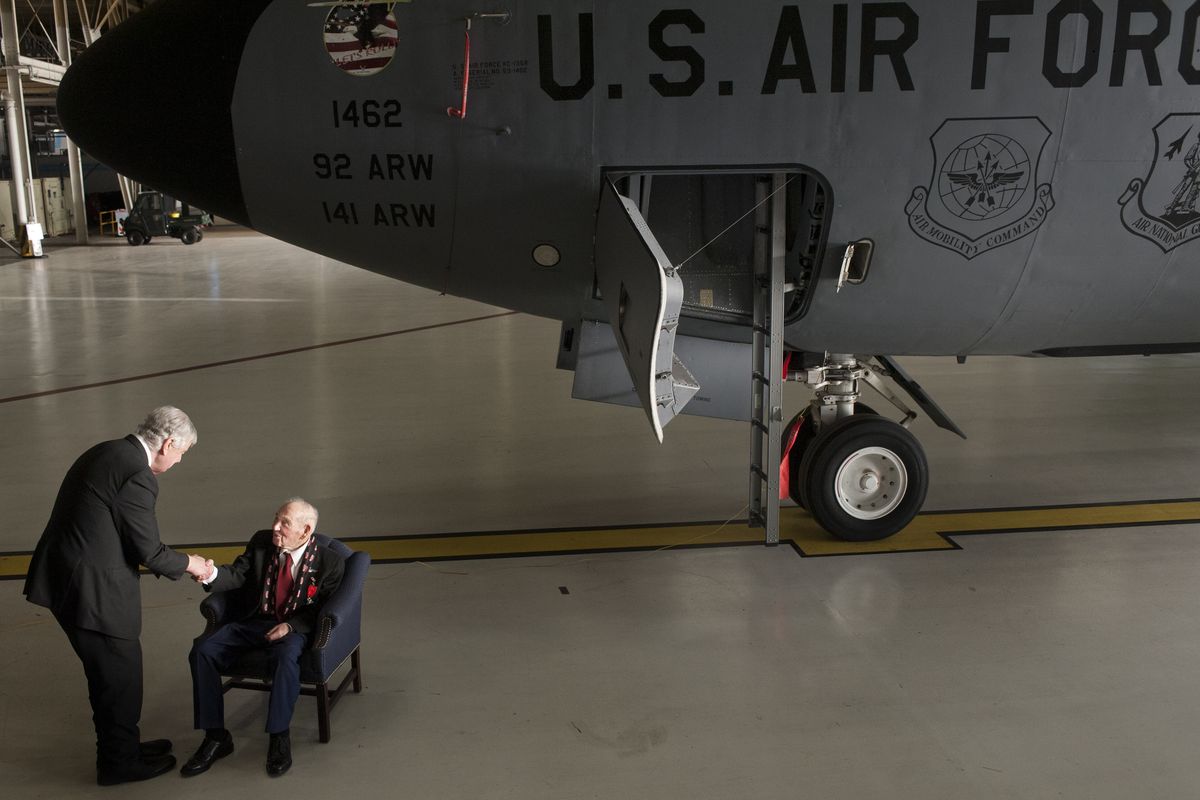France’s Legion of Honor awarded to World War II veteran

Clarence E. Grimes doesn’t think much of the dozen awards he’s received for his military service.
The 92-year-old retired Air Force major is humble about the newest medal pinned to his chest – a decoration that took about two years of work in two countries to get there.
Grimes was awarded France’s Legion of Honor on Thursday in a hangar at Fairchild Air Force Base. It’s the highest military honor the French government can give an American soldier.
The award is reserved for veterans who served in one of the campaigns of the Liberation of France during World War II. Grimes flew 35 missions over Europe, five of those over France.
Logistical challenges and paperwork slowed the presentation of the award, said Col. Brian Newberry, the commander of the 92nd Air Refueling Wing at Fairchild. Grimes himself joked that they better hurry up and give him the award before he dies, Newberry said.
But before a group of about 40 friends and family, plus many airmen stationed at the base, Grimes, flanked by the American and French flags, gave a small wave and a smile in response to thunderous applause.
“It’s so overwhelming,” Grimes said. After all, he said, facing death was just a part of the job flying over Europe during the war.
“There wasn’t anything great about that,” Grimes said.
Jack Cowan, honorary consul of France, kissed both of Grimes’ cheeks before pinning the white star to his jacket.
“I was really pleased with everything,” Grimes said. “I think it was a beautiful ceremony.”
Grimes was stationed with the 449th Bomb Group in Grottaglie, Italy, flying B-24s, his nephew Jeff Grimes said at the ceremony. The group flew 254 combat missions in 475 days, losing 388 airmen and 103 B-24 bombers. Another 363 airmen were taken as prisoners of war; 159 soldiers were shot down and evaded capture, including Grimes.
Clarence Grimes’ brother, James, doesn’t remember him talking much about the war when they were younger. Like many other World War II veterans, he preferred not to talk about it.
However, he does remember the telegram his mother received saying her son had been shot down on a mission, though James was only 8 or 9 at the time.
“That had to be really heart-wrenching for her,” he said Thursday. “It was really a bad situation.”
On another mission over Toulon in the south of France, Clarence Grimes realized just before landing that two bombs were trapped underneath the belly of the plane. The pilot couldn’t land until they’d dropped the bombs in the ocean. At 20,000 feet in the air, Grimes crawled to the opening to the bomb bay of the airplane.
With the wind roaring in his face and time running out, Grimes pulled out a dime and was able to break the pins holding the bombs loose, sending them into the sea below.
But it was just another day, Grimes said.
“We completed the mission,” he said. “Routine.”
Grimes was born and raised in Pennsylvania before joining the Army Air Corps in 1943. He retired in 1963 from Fairchild Air Force Base. Now he manages the Marshall Lake Resort in Newport.
Newberry said today’s Air Force is successful thanks to heroes like Grimes.
“We stand on the shoulders of giants,” Newberry said. “And it’s not very often we get to meet a giant.”